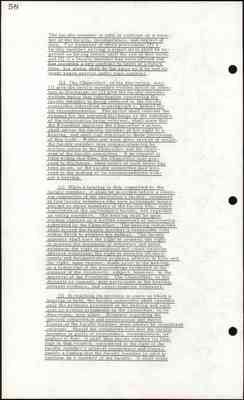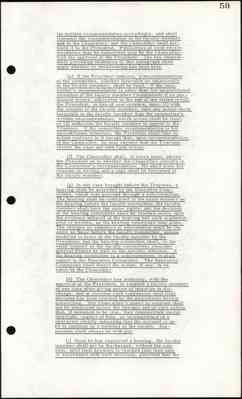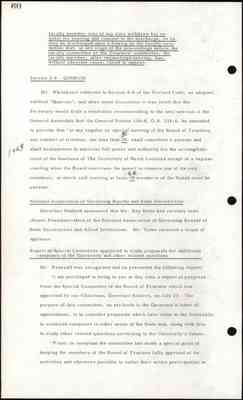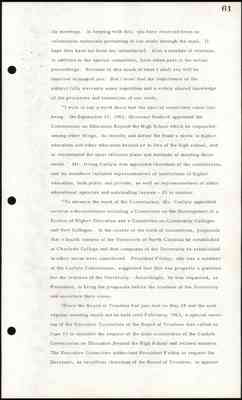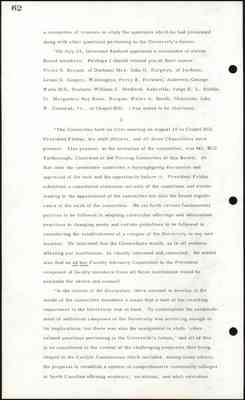Pages
58
The faculty member is unfit to continue as a member of the faculty, incompetence, and neglect of duty. For purposes of these provisions: (1) a faculty member serving a stated term shall be regarded as having tenure until the end of that term; and (2) if a faculty member has been offered and has accepted a new contract to begin at a future time, his status shall be the same as if he had already bepun service under such contract.
(b) The Chancellor, in his discretion, may: (1) give the faculty member written notice of intention to discharge; or (2) give the faculty member written notice that information concerning the faculty member is being referred to the faculty committee (identified in paragraph c, below) for its recommendation. The notice shall indicate the reasons for the intended discharge or the substance of the information being referred, shall state that the President approves the Chancellor's action, shall advise the faculty member of his right to a hearing, and shall call attention to these provisions of this Code. Within one week after receipt of notice, the faculty member may request ahearing by written notice to the Chancellor and the chairman of the faculty committee. If no request is filed within that time, the Chancellor may proceed to discharge, when notice of such intent has been given, or the faculty committee may proceed to the making of its recommendation without a hearing.
(c) When a hearing is duly requested by the faculty member, it shall be accorded before a standing committee of the institution's faculty, composed of five faculty members who have permanent tenure elected by those members of the faculty who, under legislation of the institution's faculty, are regarded as voting members. The hearing shall be upon written charges or a written summary of information submitted by the Chancellor. The hearing committee shall accord the faculty member a reasonable time within which to prepare his defense. The faculty member shall have the right to counsel; the right to present the testimony of witnesses and other evidence; the right to confront and cross-examine adverse witnesses; the right to examine all documents and demonstrative evidence adverse to him; and the right, upon request, made prior to the hearing, to a transcript of the proceedings furnished at the expense of the University, subject, however, to the approval of the President. The Chancellor, or his delegate or counsel, may participate in the hearing, present evidence, and cross-examine witnesses.
(d) In reaching its decision in cases in which a hearing is held, the faculty committee shall consider only the evidence presented at the hearing and such oral or written arguments as the committee, in its discretion, may allow. Evidence regarding the general competence and professional and moral fitness of the faculty member shall always be considered relevant. Should the committee find that the faculty member is guilty of misconduct, incompetence, or neglect of duty, it shall then decide whether its findings in that respect, considered in the light of the faculty member's general competence and fitness, justify a finding that the faculty member is unfit to continue as a member of the faculty. It shall make
59
its written recommendation accordingly, and shall transmit the recommendation to the faculty member and to the Chancellor; and the Chancellor shall forward it to the President. Publication of such recommendation may be authorized only by the Chancellor, with the approval of the President. The two immediately preceding sentences of this paragraph shall apply whether or nota hearing has been held.
(e) If the President concurs, a recommendation of the committee, whether favorable or unfavorable to the faculty member, shall be final. If the committee's recommendation is other than for unconditional retention of the faculty member ( indefinitely if on permanent tenure, otherwise to the end of the stated term), the President, in lieu of concurrence, may: (1) with the consent of the faculty member, take any action more favorable to the faculty member than the committee's written recommendation, which action shall be final; or (2) authorize the faculty member to appeal to the Trustees. If the committee recommendation is for unconditional retention, the President shall take no action contrary to it except that, upon recommendation of the Chancellor, he may request that the Trustees review the case and take final action.
(f) The Chancellor shall, in every case, advise the President as to whether the Chancellor concurs in the Committee's recommendation. He shall state his reasons in writing and a copy shall be furnished to the faculty member.
(g) In any case brought before the Trustees, a hearing shall be accorded by the Executive Committee, which may proceed through a subcommittee. The hearing shall be conducted in the same manner as the hearing before the faculty committee; the faculty member shall have the same rights; and the decision of the hearing committee shall be reached solely upon the evidence adduced at the hearing and such argument, oral or written, as the hearing committee may allow. The charges or summary of information shall be the same as those before the faculty committee, unless" modified in favor of the faculty member by the President; and the hearing committee shall, in the same manner as the faculty committee, consider general fitness as well as the specific offenses. If the hearing committee is a subcommittee, it shall report to the Executive Committee. The Executive Committee shall direct the action, if any, to be taken by the Chancellor.
(h) The Chancellor has authority, with the approval of the President, to suspend a faculty member at any time after giving notice of intention to discharge, and to continue such suspension until final decision has been reached by the procedures herein prescribed. The Chancellor's power to suspend shall not be exercised unless the charges are of such nature that, if assumed to be true, they demonstrate moral turpitude, neglect of duty, or incompetence of a character clearly indicating that the accused is unfit to continue as a member of the faculty. Suspension shall always be with pay.
(i) Once he has requested a hearing, the faculty member shall not be discharged, without his consent, until final decision is reached (and then only in accordance with such decision), provided that the
60
faculty member may at any time withdraw his request for hearing and consent to the discharge, or he may be discharged upon a finding by the faculty committee that, at any stage of the proceedings before the faculty committee or the Trustees' committee, the faculty member, after requestinga hearing, has, without adequate cause, failed to appear.
Section 2-6. QUORUM
Mr. Whitehurst referred to Section 2-6 of the Revised Code, as adopted, entitled "Quorum", and after some discussion it was voted that the Secretary would draft a resolution recommending to the next session of the General Assembly that the General Statute 116-8, G.S. 116-6, be amended to provide that "at any regular or special meeting of the Board of Trustees, any number of trustees, not less than 20, shall constitute a quorum and shall becompetent to exercise full power and authority for the accomplishment of the business of The University of North Carolina except at a regular meeting when the Board exercises the power to remove one of its own members, at which said meeting at least 50 members of the Board must be present.
National Association of Governing Boards and State Universities
Governor Sanford announced that Mr. Roy Rowe had recently been chosen President-elect of the National Association of Governing Boards of State Universities and Allied Institutions. Mr. Rowe received a round of applause.
Report of Special Committee appointed to study proposals for additional campuses of the University and other related questions
Mr. Pearsall was recognized and he presented the following report:
"I am privileged to bring to you at this time a report of progress from the Special Committee of the Board of Trustees which was appointed by our Chairman, Governor Sanford, on July 23. The purpose of this committee, as set forth in the Governor's letter of appointment, is to consider proposals which have come to the University to establish campuses in other areas of the State and, along with this, to study other related questions pertaining to the University's future.
"From its inception the committee has made a special point of keeping the members of the Board of Trustees fully apprised of its activities and wherever possible to enlist their active participation in
61
its meetings. In keeping with this, you have received from us voluminous materials pertaining to our study through the mail. (I hope they have not been too voluminous). Also a number of trustees, in addition to the special committee, have taken part in the actual proceedings. Because of this much of what I shall say will be familiar to many of you. But I trust that the importance of the subject fully warrants some repetition and a widely shared knowledge of the processes and tendencies of our study.
"I wish to say a word about how the special committee came into being. On September 15, 1961, Governor Sanford appointed the Commission on Education Beyond the High School which he requested, among other things, 'to identify and define the State's needs in higher education and other education beyond or in lieu of the high school, and to recommend the most efficient plans and methods of meeting those needs.' Mr. Irving Carlyle was appointed chairman of the commission, and its members included representatives of institutions of higher education, both public and private, as well as representatives of other educational agencies and outstanding laymen - 25 in number.
"To advance the work of the Commission, Mr. Carlyle appointed several subcommittees including a Committee on the Development of a System of Higher Education and a Committee on Community Colleges and New Colleges. In the course of the work of committees, proposals that a fourth campus of the University of North Carolina be established at Charlotte College and that campuses of the University be established in other areas were considered. President Friday, who was a member of the Carlyle Commission, suggested that this was properly a question for the trustees of the University. Accordingly, he was requested, as President, to bring the proposals before the trustees of the University and ascertain their views.
"Since the Board of Trustees had just met on May 28 and the next regular meeting would not be held until February, 1963, a special meeting of the Executive Committee of the Board of Trustees was called on June 15 to consider the request of the joint committees of the Carlyle Commission on Education Beyond the High School and related matters. The Executive Committee authorized President Friday to request the Governor, as ex-officio chairman of the Board of Trustees, to appoint
62
a committee of trustees to study the questions which he had presented along with other questions pertaining to the University's future.
"On July 23, Governor Sanford appointed a committee of eleven Board members. Perhaps I should remind you of their names: Victor S. Bryant, of Durham; Mrs. JohnG. Burgwyn, of Jackson; Lenox G. Cooper, Wilmington; Percy B. Ferebee, Andrews; George Watts Hill, Durham; William C. Medford, Asheville; Judge H. L. Riddle, Jr. Morganton; Roy Rowe, Burgaw; Walter L. Smith, Charlotte; John W. Umstead, Jr. , of Chapel Hill. I was asked to be chairman.
II
"The Committee held its first meeting on August 10 in Chapel Hill. President Friday, his staff officers, and all three Chancellors were present. Also present, at the invitation of the committee, was Mr. Hill Yarborough, Chairman of the Visiting Committee of this Board. At that time the committee conducted a thoroughgoing discussion and appraisal of the task and the opportunity before it. President Friday submitted a considered statement not only of the conditions and events leading to the appointment of the committee but also the broad significance of the work of the committee. He set forth certain fundamental policies to be followed in adapting curricular offerings and admissions practices to changing needs and certain guidelines to be followed in considering the establishment of a campus of the University in any new location. He indicated that the Chancellors would, as in all matters affecting our institutions, be closely informed and consulted. He stated also that an ad hoc Facuity Advisory Committee to the President composed of faculty members from all three institutions would be available for advice and counsel.
"In the course of the discussion, there seemed to develop in the minds of the committee members a sense that a task of far-reaching importance to the University was at hand. To contemplate the establishment of additional campuses of the University was arresting enough in its implications; but there was also the assignment to study ' other related questions pertaining to the University's future, ' and all of this to be considered in the context of the challenging proposals then being shaped in the Carlyle Commission which included, among many others, the proposal to establish a system of comprehensive community colleges in North Carolina offering academic, vocational, and adult education
